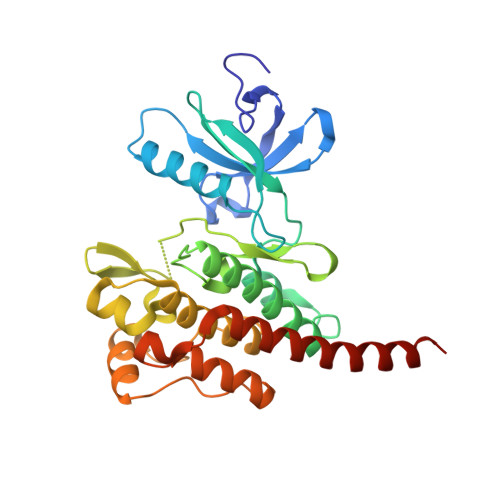AP24534, a pan-BCR-ABL inhibitor for chronic myeloid leukemia, potently inhibits the T315I mutant and overcomes mutation-based resistance.
O'Hare, T., Shakespeare, W.C., Zhu, X., Eide, C.A., Rivera, V.M., Wang, F., Adrian, L.T., Zhou, T., Huang, W.S., Xu, Q., Metcalf, C.A., Tyner, J.W., Loriaux, M.M., Corbin, A.S., Wardwell, S., Ning, Y., Keats, J.A., Wang, Y., Sundaramoorthi, R., Thomas, M., Zhou, D., Snodgrass, J., Commodore, L., Sawyer, T.K., Dalgarno, D.C., Deininger, M.W., Druker, B.J., Clackson, T.(2009) Cancer Cell 16: 401-412
- PubMed: 19878872
- DOI: https://doi.org/10.1016/j.ccr.2009.09.028
- Primary Citation of Related Structures:
3IK3 - PubMed Abstract:
Inhibition of BCR-ABL by imatinib induces durable responses in many patients with chronic myeloid leukemia (CML), but resistance attributable to kinase domain mutations can lead to relapse and a switch to second-line therapy with nilotinib or dasatinib. Despite three approved therapeutic options, the cross-resistant BCR-ABL(T315I) mutation and compound mutants selected on sequential inhibitor therapy remain major clinical challenges. We report design and preclinical evaluation of AP24534, a potent, orally available multitargeted kinase inhibitor active against T315I and other BCR-ABL mutants. AP24534 inhibited all tested BCR-ABL mutants in cellular and biochemical assays, suppressed BCR-ABL(T315I)-driven tumor growth in mice, and completely abrogated resistance in cell-based mutagenesis screens. Our work supports clinical evaluation of AP24534 as a pan-BCR-ABL inhibitor for treatment of CML.
Organizational Affiliation:
Division of Hematology and Medical Oncology, Oregon Health & Science University Knight Cancer Institute, Portland, OR 97239, USA.















